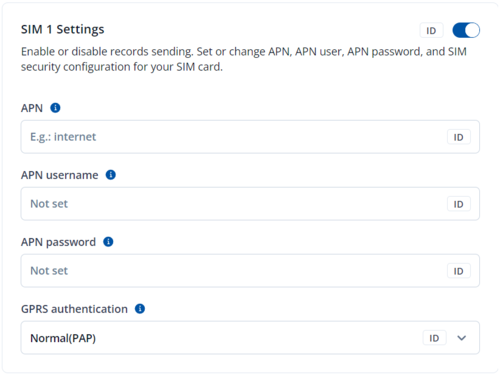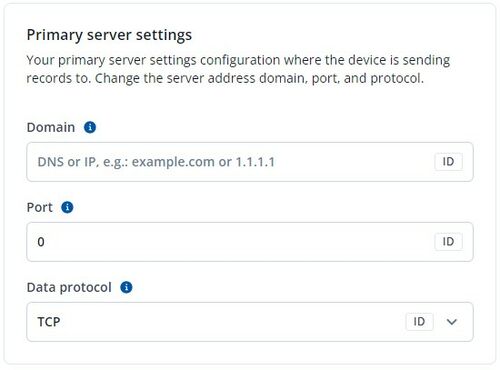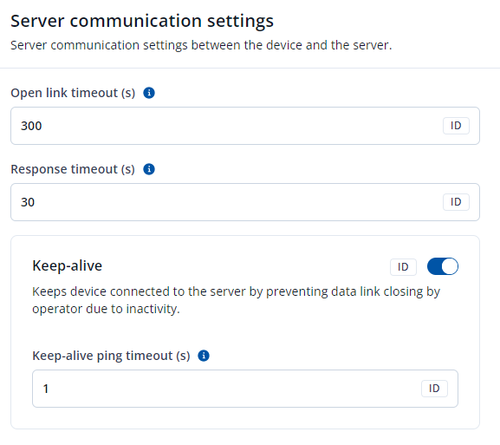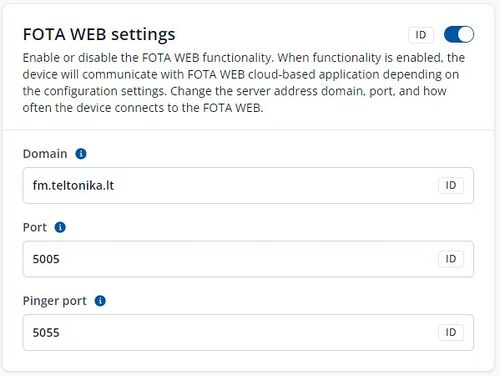Difference between revisions of "Template:FTX8XX/9XX Mobile Network"
From Wiki Knowledge Base | Teltonika GPS
| (16 intermediate revisions by 2 users not shown) | |||
| Line 1: | Line 1: | ||
==Mobile data settings== | ==Mobile data settings== | ||
| − | [[File: | + | [[File:Mobile Data Settings.png|right|500px]] |
| − | These settings define the main parameters for {{{model| | + | These settings define the main parameters for {{{model|FTC881}}}. <br/ > |
| − | |||
| − | |||
'''APN:''' | '''APN:''' | ||
*Access point name, a mandatory parameter which is used to connect to the internet (GPRS). Access Point Name is the name of a gateway between a mobile operator and the public internet. It can be obtained from your SIM card provider. | *Access point name, a mandatory parameter which is used to connect to the internet (GPRS). Access Point Name is the name of a gateway between a mobile operator and the public internet. It can be obtained from your SIM card provider. | ||
| Line 13: | Line 11: | ||
'''GPRS Authentication:''' | '''GPRS Authentication:''' | ||
* Some operators use a specific type of authentication for GPRS sessions – Normal (PAP) or Secured (CHAP). If any of these is used, APN should be entered as "chap:<APN>" or "pap:<APN>" respectively. E.g. if the operator is using APN "internet" with CHAP authentication, it should be entered as "chap: internet". Information about APN and authentication type should be provided by your GSM operator. <br /> | * Some operators use a specific type of authentication for GPRS sessions – Normal (PAP) or Secured (CHAP). If any of these is used, APN should be entered as "chap:<APN>" or "pap:<APN>" respectively. E.g. if the operator is using APN "internet" with CHAP authentication, it should be entered as "chap: internet". Information about APN and authentication type should be provided by your GSM operator. <br /> | ||
| + | <br> | ||
<br> | <br> | ||
<br> | <br> | ||
| Line 23: | Line 22: | ||
*Server Port | *Server Port | ||
'''Data protocol''' | '''Data protocol''' | ||
| − | *TCP (Transmission control protocol) or UDP (User datagram protocol). Changing this parameter will alter how the device communicates | + | *TCP (Transmission control protocol) or UDP (User datagram protocol). Changing this parameter will alter how the device communicates. For more information on the protocol differences of Teltonika devices, refer here [https://wiki.teltonika-gps.com/view/Teltonika_Data_Sending_Protocols] |
| − | |||
| − | |||
| − | |||
| − | |||
| − | |||
==Server communication settings== | ==Server communication settings== | ||
| Line 35: | Line 29: | ||
'''Open link timeout (s)''' | '''Open link timeout (s)''' | ||
| − | *The parameter is used to define a timeout between the fleet management device and the server. If the device has sent all records, | + | *The parameter is used to define a timeout between the fleet management device and the server. If the device has sent all records, device holds the link for duration of the configured timeout. “Open link timeout” will refresh after device sends a new record. If there is a need to keep a constant link with a server, increasing the value of the parameter is needed. |
'''Response timeout (s)''' | '''Response timeout (s)''' | ||
| − | * | + | *Is used to set a period of time waiting for the response from the server-side. If there is no response from the server during the timeout, the device will close the link and according to device configuration resend the same packet |
'''Keep-alive ping timeout (s)''' | '''Keep-alive ping timeout (s)''' | ||
| − | * | + | *enables network ping after timeout to prevent link close by operator. For example, if the operator closes the active link after 15 minutes when no data is sent, you can set the "network ping" timeout to 10 minutes then the device sends a 0xFF byte to server to keep the link open. Keep-alive ping timeout should be always lower than Open Link Timeout. |
| − | |||
| − | |||
| − | |||
| − | |||
| − | |||
==FOTA Web settings== | ==FOTA Web settings== | ||
| − | + | [[File:FTC FOTA WEB.jpg|right|500px]] | |
| − | [[File:FOTA | ||
'''domain''' | '''domain''' | ||
*Domain which points to FOTA Web. | *Domain which points to FOTA Web. | ||
| Line 59: | Line 47: | ||
'''Pinger port''' | '''Pinger port''' | ||
*FOTA Web pinger port | *FOTA Web pinger port | ||
| + | |||
| + | [[Category:{{{model}}} Configuration]] | ||
Revision as of 05:03, 23 May 2024
Mobile data settings
These settings define the main parameters for FTC881.
APN:
- Access point name, a mandatory parameter which is used to connect to the internet (GPRS). Access Point Name is the name of a gateway between a mobile operator and the public internet. It can be obtained from your SIM card provider.
APN Username:
- Access point name username (optional – depending on operator)
APN Password:
- Access point name password (optional – depending on operator).
GPRS Authentication:
- Some operators use a specific type of authentication for GPRS sessions – Normal (PAP) or Secured (CHAP). If any of these is used, APN should be entered as "chap:<APN>" or "pap:<APN>" respectively. E.g. if the operator is using APN "internet" with CHAP authentication, it should be entered as "chap: internet". Information about APN and authentication type should be provided by your GSM operator.
Server settings
Domain:
- Server or Domain address, either IP address or Domain can be written.
Port:
- Server Port
Data protocol
- TCP (Transmission control protocol) or UDP (User datagram protocol). Changing this parameter will alter how the device communicates. For more information on the protocol differences of Teltonika devices, refer here [1]
Server communication settings
Open link timeout (s)
- The parameter is used to define a timeout between the fleet management device and the server. If the device has sent all records, device holds the link for duration of the configured timeout. “Open link timeout” will refresh after device sends a new record. If there is a need to keep a constant link with a server, increasing the value of the parameter is needed.
Response timeout (s)
- Is used to set a period of time waiting for the response from the server-side. If there is no response from the server during the timeout, the device will close the link and according to device configuration resend the same packet
Keep-alive ping timeout (s)
- enables network ping after timeout to prevent link close by operator. For example, if the operator closes the active link after 15 minutes when no data is sent, you can set the "network ping" timeout to 10 minutes then the device sends a 0xFF byte to server to keep the link open. Keep-alive ping timeout should be always lower than Open Link Timeout.
FOTA Web settings
domain
- Domain which points to FOTA Web.
Port
- FOTA Web port for connection to FOTA Web
Pinger port
- FOTA Web pinger port
[[Category:{{{model}}} Configuration]]



